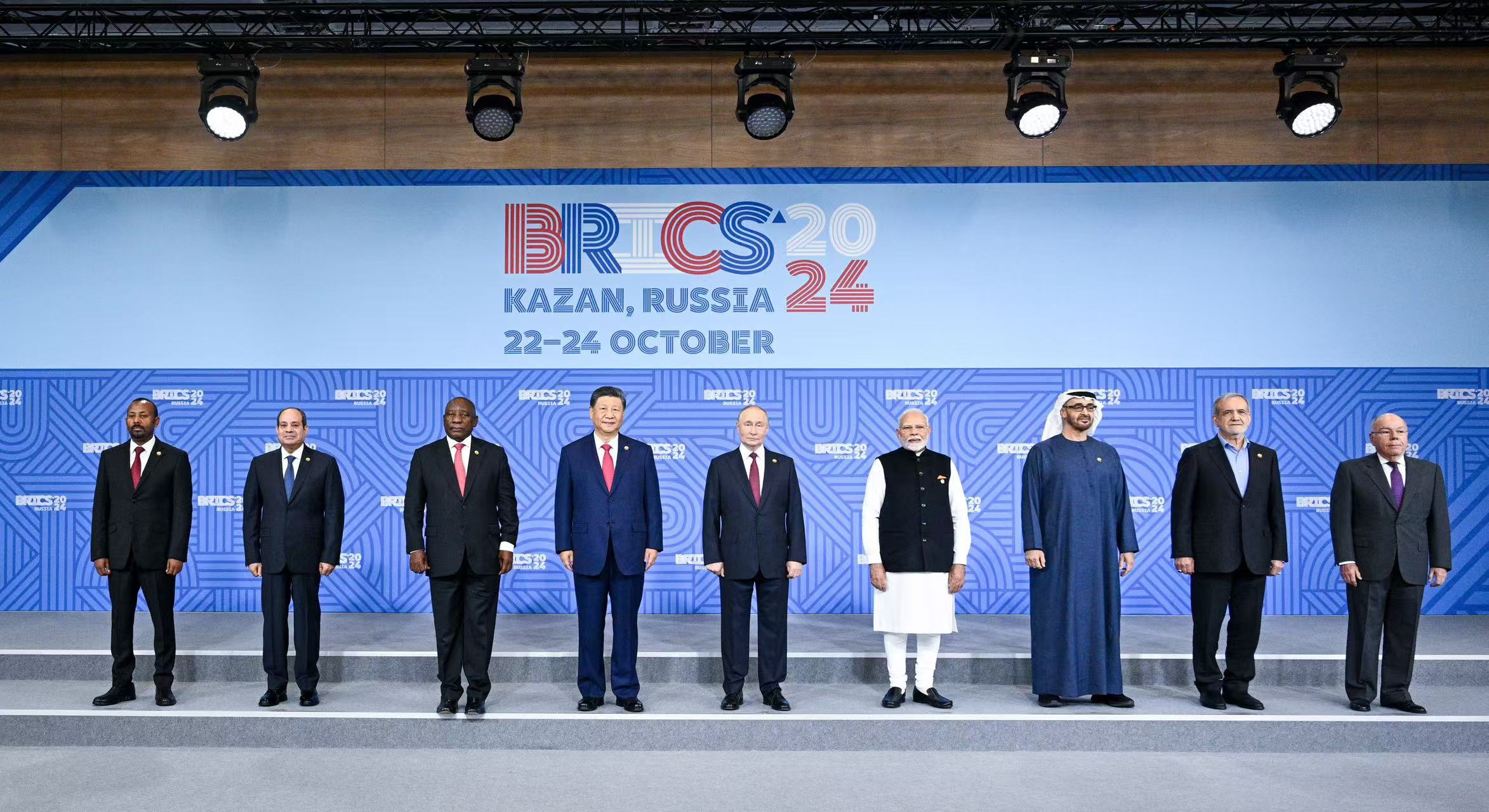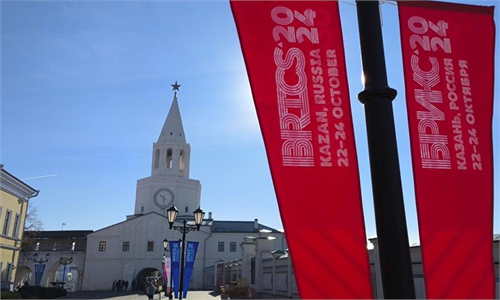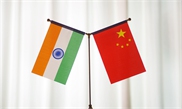
Leaders participating in the 16th BRICS Summit pose for a group photo in Kazan, Russia, on October 23, 2024. Photo: Xinhua
Chinese President Xi Jinping on Wednesday called on BRICS members to conform to the general trend of the rise of the Global South and actively respond to the call of countries to join the BRICS cooperation mechanism. The group should advance the process of expanding membership and establishing partner countries and enhance the representation and voice of developing countries in global governance, Xi said. He made the remarks when addressing the 16th BRICS Summit.
He called on the BRICS members to build BRICS for peace and act as guardians of common security, urging the BRICS countries to uphold the three principles of no expansion of the battlefield, no escalation of fighting and no provocation by any party, to work for de-escalation of the Ukraine crisis as soon as possible.
The Chinese president also called on BRICS members to build BRICS for innovation and act as pioneers for high-quality development.
In addition, he called on BRICS members to build green BRICS and be practitioners of sustainable development.
Xi also called for building a BRICS for justice and leading the reform of the global governance system. The Chinese president also urged BRICS countries to advocate peaceful coexistence and harmony between civilizations.
The ongoing BRICS Summit has decided to invite a number of nations to become partner countries, Xi said, hailing the decision as another important development in the course of BRICS development.
China will establish 10 overseas learning centers in BRICS countries to provide training opportunities for 1,000 education administrators, teachers and students, Xi said.
As chair of the BRICS Summit, Russian President Vladimir Putin opened a 10-member meeting in Kazan on Wednesday, TASS reported.
UN Secretary General Antonio Guterres also arrived in Russia on Wednesday to attend the summit, according to AFP.
Tangible opportunities
Experts noted that over the years, BRICS has differentiated itself from other organizations through its tangible results and significant progress achieved during cooperation. These outcomes not only enhanced the organization's appeal to Global South countries, but also amplified their voices, uniting their influence and establishing BRICS as a steady force in safeguarding global security.
BRICS has maintained or revived the Global South. For example, we can learn from China's experience of leaving no one behind, not allowing people to suffer from lack of food and lifting people from poverty, Shadrack Andile, a journalist from BRICS Africa Channel told the Global Times.
Now that the world is changing, and BRICS can play a more significant role to provide development opportunities for Global South countries, said Andile, noting that some BRICS initiatives are quite important and they need to happen faster than they are.
Some multilateral cooperation mechanisms are labeled as mere "talking shops" as they tend to be abstract, but BRICS has proved different, and BRICS has achieved many tangible results that set it apart, Wang Youming, director of the Institute of Developing Countries at the China Institute of International Studies in Beijing, told the Global Times.
For example, the New Development Bank, set up by BRICS, has made significant contributions to infrastructure development and sustainable growth in developing countries, and the establishment of the BRICS Partnership on New Industrial Revolution Innovation Center in Xiamen [of China], has achieved notable results in policy communication, project development and talent training, Wang said.
It is this pragmatic and action-oriented spirit of BRICS that has resonated with many countries in the Global South, many of which are eager to join BRICS and expand their benefits through collective collaboration, the expert said.
Global South voice
BRICS countries primarily play a bridging and alleviating role in addressing ongoing security crises, Li Haidong, a professor at China Foreign Affairs University, told the Global Times on Wednesday.
Li said that the China-proposed Global Security Initiative has already been fully reflected in the BRICS mechanism, which means that member countries would aim to guide existing crises, conflicts and unrest toward a path of gradual alleviation and resolution.
Many countries in the Global South oppose the Western approach of exacerbating conflicts and providing military support. Instead, they advocate political solutions and diplomatic approach to resolving disputes, Wang noted. He emphasized that this summit aims to amplify the voices of the Global South regarding ongoing global conflicts and to offer an alternative to the Western way of resolving hotspot issues.
In an interview with "Russia Today" on Tuesday, Egyptian Foreign Minister Badr Abdelatty stressed that Egypt is against the policy of political polarization, saying "we face serious and existential challenges at the regional and international levels, a matter that necessitates consensus among major countries.
"We count on this economic bloc [BRICS] to be a voice for the Global South and developing countries," Abdelatty said.
BRICS is one of the key symbols of the transition toward multipolarity. Its demographic, economic, energy, political, diplomatic, security and normative power have boosted its soft power. Proponents of multipolarity worldwide, be it in Asia, Africa, South America or the Middle East, rightfully object to the imposition of the Western "rules-based order" and the imposition of Western values, norms, institutional arrangements and development paths, Aleksandar Mitic, Research Fellow at the Centre for Belt and Road Studies of the Institute of International Politics and Economics in Belgrade, Serbia, told the Global Times.
BRICS has never aspired to replace any existing organizations, and its goal is to reform and innovate the inequities of the existing global order, striving for a system that is fair and equitable, and advocate a model of governance characterized by joint decision-making, consultation and shared benefits, said Zhu Tianxiang, executive dean of the Institute of BRICS Studies at Sichuan International Studies University.




